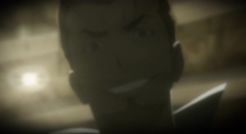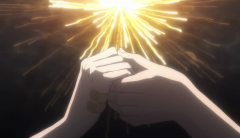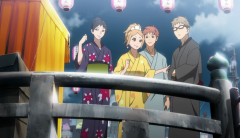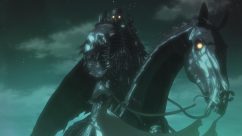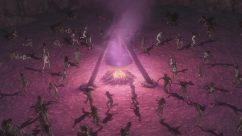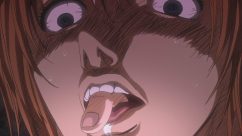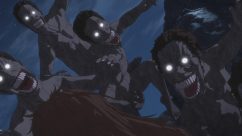The episode picks up where the last one left off, with the lakeside haunting of Casca and Nina. We see the brand attracting ghouls followed by the Demon Child warding them off. For those who might be unfamiliar with the franchise, the Demon Child is Casca’s infant, and it’s been corrupted by the Godhand form of Griffith, Femto. The child’s powers were never clearly explained, but it’s safe to assume that he takes a bit after his stepfather. This will be further explored in the coming chapters.
The next scene marks the return of the Skull Knight. I’m definitely disappointed that we didn’t get to see the fight between Guts and the Wheel Skeletons. It’s not really a crucial scene, but given the iconic design of the monsters it is still a letdown. Skull Knight warns Guts of the significance of the ‘hawk dream’ which apparently was shared with him as well. Guts calls him “old man” which is a bit of an understatement, given that he’s at least a thousand years old.
Speaking of millennia, the Skull Knight explains that an Eclipse-like event is about to unfold, which takes place every thousand years. It’s unclear if he’s referring to the general descend of the Godhand, or specifically to the rebirth ceremony. It is widely believed that the he is the psedo-apostle form of another character in the Berserk universe called Emperor Gaiseric. He supposedly united the nations of Midland over a thousand years ago. Later in the episode we learn that the emperor imprisoned a man that refused to deny his sins. The prisoner must’ve been in the possession of a Behelit, as his trial ends with an Eclispe. This occurrence causes the empire to crumble, and earlier in the story we see the remains of branded bodies in the tower where Griffith was being held prisoner. It’s unknown if Gaiseric ever became a Godhand and then later reborn, or gained his powers from a separate source.
The scene comes to a close with Guts asserting his intention of saving Casca, no matter what gets in his way. I have to say that it’s refreshing to see this defiant side of Guts again. His resolute attitude and disregard for warnings and danger is a core part of his personality, and one of the main reasons why he’s such a beloved character. He fights on against all odds, and his neverending struggle is symbolic to the spirit of survival that keeps pushing all humanity forward. This charming arrogance is sorely missing from some of the new chapters of the manga. Readers who are staying up-to-date probably know what I’m talking about. He has been portrayed uncharacteristically timid in the newer installments. This might be due to character growth, but I’m hoping that it’s temporary, and that we’ll soon get to see the true berserker in action.
We switch back to the Tower of Conviction, as a doubtful Farnese is reflecting on the state of affairs. There is a subtle juxtaposition of the relative prosperity of the Holy Iron Chain Knights, set against the hunger and famine that continue to ravage the land outside. If you’ve been paying attention, there are frequent close-up shots of Farnese throughout the series. I realized that the reason for these is most likely because the close angles hide the uncanniness of the CGI, and create a more drawn look to her face. Moving on, we get to see the prostration of Mozguz, and him reassuring Farnsese of her faith, by an appeal to blindly following the divine authority. Even in reality, blind faith is often used to give purpose to those who are distressed by uncertainty. It’s also explained how Mozguz targets the social outcasts and uses their ostracization as a tool for recruitment.
We then head back to the campsite, and are introduced to Nina’s thirsty lover, Joachim. He’s mostly used as a plot-device for the viewers to get to see the other side of Nina, as she invites him to their secret gathering. As I expected, the episode includes the infamous cave scene. Similar to the manga, the gathering is a plethora of psychedelics, sex and cannibalism. I guess now we know where Nina caught that nasty little STD. Among the storm of hedonism it seems that some curious nipple-theft is taking place, and nobody’s the wiser. It’s surprising that so much nudity is included, especially given the fact that they were well aware of their limitations due to censorship. It’s not really a big deal, but it’s seriously distracting. The orgy scene itself is drawn minimally and awkwardly, giving it a clean and sterile look that detracts from the sense of grotesque that they were going for. No matter how much they distort the images, and draw characters off-model, this still doesn’t look all that hellish. The cannibalistic imagery might be the only aspect of it that is slightly unnerving. We also get a glimpse of the Goat Head, who serves as the leader of sorts to the cult. I’ll be discussing him in more detail in the upcoming episodes.
The party is interrupted when Joachim is chased out of the cave, leading to his fall into the ravine. He’s later found by the Egg-Shaped Apostle, which will be playing a crucial part in what’s to come. It’s always good to see Luca, as she takes no nonsense from Nina, and promptly starts scolding her for her stupidity. Their reconciliation doesn’t last long, as Casca’s discovery leads to an attempted rape by a group of impressively aerodynamic men, which itself is interrupted by the manifestations of some more ghosts. This scene is very awkward, since the few models they had were reused so many times, in some instances standing almost next to eachother. The saving grace is that the scene is brief, as the Demon Child yet again dispels the apparitions.
Similar to episode three, this one also has an extended post credit scene. We get to explore the backstory of both Farnese and Serpico. Farnese is engaged in almost Lady Melisandre levels of pyromania, and it is shown that this is deeply rooted in her childhood. Serpico again demostrates that he’s a sympathetic fellow, and it’s his tragic past that has brought him into the Vandimion fold; that among other things. This episode in whole was rather plain looking, and primarily used as set-up for the next one. I understand that there was no way to exclude this whole section, but I hoped that they portrayed it with some more energy. The grey muddy colors are really tiring, and at this point I can’t wait for the Eclipse to bring some change in the scenery. The next episode is called “The Black Witch” so at least we know it’ll be racist. I jest, in reality we’re going to get a big reunion, but not a particularly sweet one. Things always seem to pick up when Guts enters the picture, and so the next one is going to be a more dynamic episode
~Bam~



